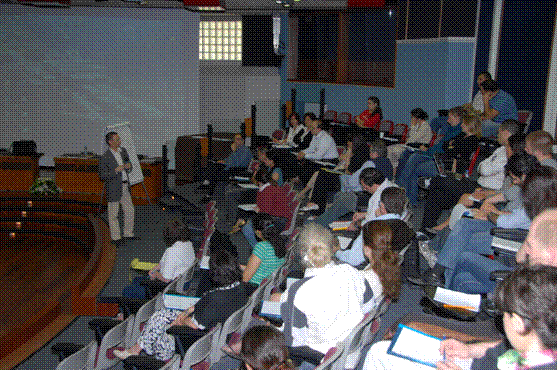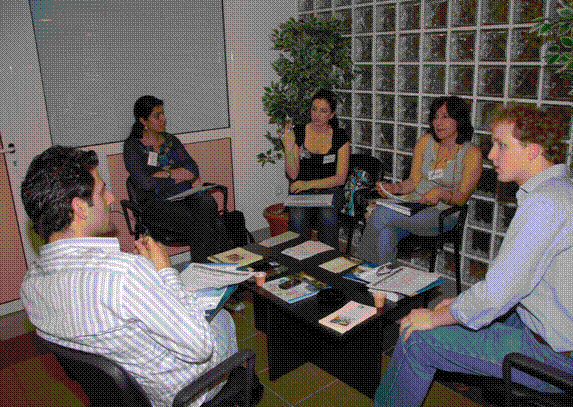International scholars, students and professionals undertake intensive training at the Lebanese Emigration Research Center.
24 to 29 April. LERC, NDU.
By Alexander Henley
Visiting Research Assistant
Held jointly by the International Migration, Integration and Social Cohesion (IMISCOE) Network of Excellence and the Lebanese Emigration Research Center (LERC) at Notre Dame University (NDU), the programme addressed the difficulties of research in the field of international migration and integration, with a particular focus on the Middle East and North Africa (MENA) region.
Expert instruction over five days, 24-29 April, was given by four IMISCOE scholars: Dr Jan Rath and Liza Nell from the Institute for Migration and Ethnic Studies in the Netherlands; August Gächter from the Centre for Social Innovation in Austria; and Professor Ahmet Içduygu from the Migration Research Programme at Koç University in Turkey. Important input on the practice of researching in Lebanon and surrounding countries was given by the organisers, LERC Associate Director Guita Hourani and NDU Associate Professor Eugene Sensenig-Dabbous. Administrative support was provided by Miss Basma Abdel-Khalek, Research Assistant with LERC.
The course attracted participants from Lebanon, the USA, the UK, Germany, and Egypt pooling the skills and experience of some of the most promising professors and young researchers working in the field or related fields. A number of prestigious universities from Lebanon to America were represented, alongside professionals working in political and NGO policy-making.
Instruction focused on the methodology of migration research. With the presence of researchers educated in different parts of the world, there was emphasis on discrepancies between critical modes of thought in different regions. In particular, the course was conducted with a view to integrating the study of migration in MENA into the global scholarship, with the latter’s critical standards and methodological schools that guide its work. Parallel with this aim was a recognition that the practices and expectations of this “global” academy are in many instances shaped by Western traditions of scholarship. It was important therefore to address the specific challenges posed by research in the MENA region, and to learn how to circumnavigate shortcomings in the available data, and to deal with limitations on data collection, as well as doing research in conflict environments.
This event gave participants the opportunity not only to benefit from the knowledge of the instructors, but also to share their resources through seminars, discussion groups, and a methodology master-class. Social events were included in the structure of the programme, and lively dialogue continued in and out of the auditorium over the full six days. Both IMISCOE and LERC are founded on commitments to foster cooperation and communication within a field that is itself defined by global human networks.
Recognising migration as an existential human reality, the group visited a Caritas centre on Sunday 27 April. Participants were given an insight into the work of the NGO with both refugees and migrant workers. Results of grass-roots research conducted by Caritas in Lebanon were presented, and migrant individuals currently under their care volunteered to share their personal experiences in smaller groups.
Participants received certificates of accomplishment from IMISCOE and LERC which were presented by Fr. Walid Moussa President of NDU in the presence of Dr. Assaad Eid, NDU Vice President for Research and Development, Ms. Liza Nell representing IMISCOE, Ms. Hourani and Dr. Sensenig-Dabbous representing LERC. More importantly, however, participants took away with them a greater knowledge and deeper understanding of the study of international migration, having acquired tools that will shape future research on the movement of peoples to, from and through the Middle East and North Africa.
Dr. Rath stated that this type of training had not been done before by IMISCOE and that the institution was counting on learning from this experience for future similar initiatives.

August Gächter one of the four IMISCOE trainers delivering his session at the IMISCOE/LERC training.

One of the working group sessions in the IMISCOE/LERC training from left to right: Joe Malkoun, Victoria El-Berry, Tania Feghali, Liliane Haddad, and Alex Henley.